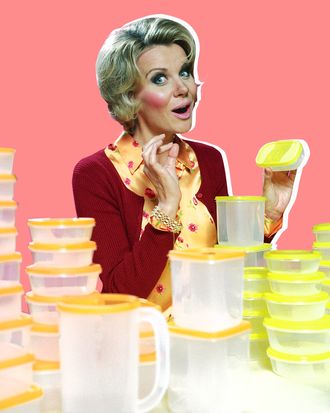
Ahhh, I’m sorry to do this to you, but it’s time for you (and me) to think about the potentially harmful side effects of our everyday use of plastic to store/heat up/serve our food and drinks. You’re probably aware of the issue — you’ve seen all the water bottles advertised as BPA-free, so you understand that some plastic is worse than other plastic — but if you’re anything like me, you’ve submerged the threat of plastic deep beneath many, many other seemingly more pressing concerns, like climate change, and nuclear war, and the erosion of civil rights, and the possibility that your headache is actually a brain tumor. Some things you just can’t make space for if you want to continue on with the charade of a normal life, you know? For instance, I do not care about germs, simply because I cannot afford to. I’ll lick a subway pole for ten dollars. I’ll be fine.
Plastic poisoning is (was?) another one of those unaffordable fears, mostly because not using plastic seems impossible. As pointed out by Vox, it’s what much (even most) of our food is stored in, and it becomes especially dangerous when heated. Which I do all the time. So far today I have eaten bread from a plastic bag and yogurt from a plastic bin and drank water from a surely BPA-laden water tumbler and it’s barely 10 in the morning. So what exactly is all that plastic doing to me?
Unfortunately, it’s still impossible for scientists to be sure. We know that certain plastics can affect hormones, mimicking estrogen to interfere with important pathways in the thyroid gland — though, again, what exactly this means for the human body is unclear. But because humans are exposed to plastic constantly, from a number of different sources, it’s very difficult to draw any conclusive causal effects from a given source to a particular side effect. Studies in animals allow scientists to draw more specific conclusions, but extrapolating from mice (or even monkeys) to humans can be misleading.
One particularly concerning animal study, though, found that Rhesus monkeys exposed to BPA suffered “disruption in two critical cases of egg development, which could lead to lower egg quality and decreased fertility.” While the monkeys were given doses of BPA comparable to those that would be ingested by humans, it’s difficult to know whether humans would react the same way. Many animal studies employ very high doses of BPA (or other plastics), well beyond what most humans will be exposed to, said Dr. Frederick Vom Saal, an endocrinologist and professor emeritus at the University of Missouri.
That said, what evidence we do have for plastic’s effect on humans is not good: a 2013 literature review found “associations between BPA exposure and adverse perinatal, childhood, and adult health outcomes, including reproductive and developmental effects, metabolic disease, and other health effects.” Even so-called BPA-free products pose a threat — many companies simply use BPS, a BPA substitute with proven detrimental effects in aquatic animals, which are considered viable models for human disease.
So that’s it. It’s all over. You’re worried about this now, and so am I. Plastic is definitely hard to avoid, but Vox has a few suggestions (of admittedly limited practicality) “Eat fresh fruits and vegetables when possible, so that you avoid plasticized storage containers with chemicals that can leach into your foods; don’t microwave food or drinks (including infant formula and pumped human milk) in plastic” and “opt for glass or stainless steel to store your food.” Can’t hurt to try.





